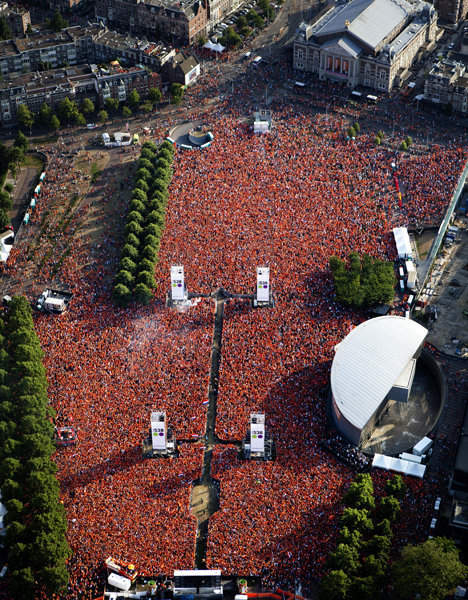In the DFAIT Intercultural Effectiveness course that I took before I went to Ghana, the instructor described the "Stages of Cultural Adaptation". The pre-departure jitters --> the honeymoon phase --> culture shock --> adaptation --> re-entry shock. The duration of each stage depends on the individual and the experience -- in my 6 month post in Ghana, the honeymoon lasted about 3 weeks, culture shock about 3 weeks, then adaptation for about 5 months interspersed with mild honeymoon/culture shock blips.
| [borrowed from http://www.expatmumsblog.com] |
When I moved from Abu Dhabi to Amsterdam my pre-departure jitters were virtually non-existent because it took me over a year to move here -- normally I give myself about 2 weeks notice before I move to a new country. And remarkably, I seem to have remained in the honeymoon stage for the past five months here. I have characterised this post-Abu Dhabi interstitial period as:
"Mini retirement"
"Sabbatical"
"Intermission"
And have used the following job titles:
"Kept woman"
"Home economist"
"Lady who lunches with ladies who lunch"
And my favourite, courtesy of Patricia: "You're not unemployed, you're a 'freelancer'"
After leaving Abu Dhabi, I had given myself a month and a half in Canada to refuel so that I was ready for the job hunt as soon as I settled in Amsterdam. But I quickly learnt that Amsterdam in May is not a place for professional ambitions, it is much better suited for leisurely self-indulgence.
"You know, when I first moved to Amsterdam, I was really expecting to land running, but it has surprised me how long it took me to get on my feet here."
"I know, everyone I've met here is an unemployed ex-pat partnered with a Dutch person, who was a professional-over-achiever until they landed in Amsterdam."
"Exactly, no one is expected to do anything their first six months."
"But even if I tried to do 'nothing', I just can't be idle. My natural default is hectic productiveness, and I always have a lot of to show for my time. I don't expect Amsterdam to be any different."
Five months after saying that, I do have a lot to show for my first six months post-Abu Dhabi, but not the sort of stuff I had initially meant. Instead, Amsterdam taught me a lesson in leisure this summer:
Public Holidays. With Queen's Day as the opener, May is the month of public holidays in the Netherlands. Queen's Day was a lively inauguration into Dutch street festivities, followed by Remembrance Day, Liberty Day, Ascension Day...and the list continues. By the time June had begun, most people had forgotten what it's like to work a five-day week!
 |
| Queen's Day, Amsterdam, borrowed from www.iamsterdam.com. |
"No one here has gone to the office since the World Cup began."
 |
| 120,000 people at Museumplein for the World Cup Final, borrowed from www.mobypicture.com. |
"What's your schedule this week?"
"I'm fitting my 1200 sf apartment in Abu Dhabi into our 400 sf apartment in Amsterdam. All week."
Art. Art is everywhere in Amsterdam, and it's not something reserved for an artistic elite -- it's children's playgrounds, people singing on their bikes, temporary train station installations, overhead lamps, and random street characters. A week doesn't pass by where I haven't seen a group of people dressed in costume break out into song.
Visitors. I finally live in a city that is both central and desirable to visit, and whether it was a quick beer during a layover, or a week of hosting houseguests, we had a summer filled with reunions and good company. Literally every week since I moved here, we have either been out-of-town, or someone has been visiting, and it has been a fantastic way to transition into life here, surrounded by familiar faces.
Cooking. I've never been the primary chef in the household, nor do I ever plan on becoming one, but I've had fun learning how to cook and buy groceries this summer. We have a farmer's market 50m from our doorstep every Saturday and a vintage market 100m away every Monday. We invented a fantastic salad with goat's cheese, the crusty bits on top of fattoush, pasta, strawberries, and chicken; I learnt how to make stuffed butternut squash; Reinier learnt how to make cepelinai (Lithuanian mega-perogies); and I remembered how to make some of my old faves such as okonomikyaki, stir fry udon, and poor man's sushi.
Couples. One of the biggest adjustments for me has been living in a coupled world. Everyone in Amsterdam lives with their partner, usually expat female + Dutch male. I don't think Dutch people marry Dutch people anymore.
Modes of Transportation. Amsterdam has some very creative ways of getting around, including the beer bike, the penis bike taxi, the luge bicycle, and the disabled guy who pops a wheeley through crowded squares.
 |
| Beer Bike, with fully functional taps, borrowed from conortje.wordpress.com. |
Trips. We found ourselves saying an enthusiastic "Yes!" to every travel opportunity that landed at our doorstep this summer. And since we never know how long we'll be living in Europe, we felt it was the responsible thing to do. Mountain biking, camping, family, building sand forts, sailing, yachting, reunions...a special thanks to my family in Lithuania for being such outstanding hosts, as always!
By September I was actually looking forward to the transition from summer bedlam into autumn order. As the leaves begin to brown, this week I also started Dutch courses and working part-time setting up a Dutch Waterfront Centre and Network, and next week I start working a second part-time job.
It's been 5 years since I spent a winter in the temperate north, I can sense that the honeymoon is about to end at the same rate as the winter sets in.



